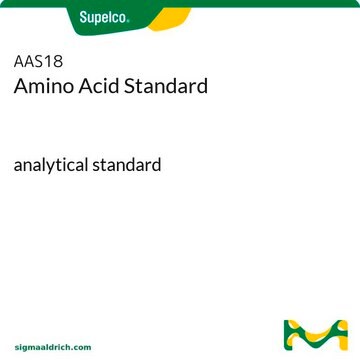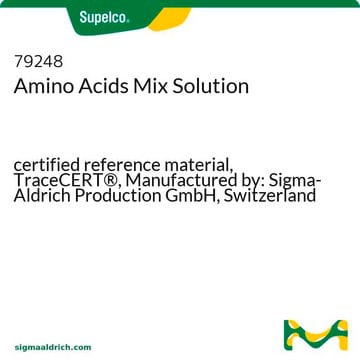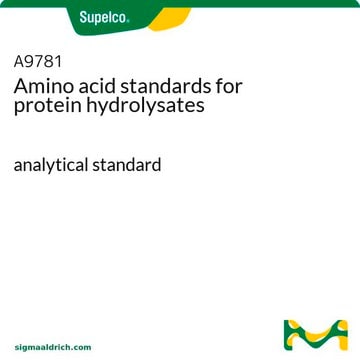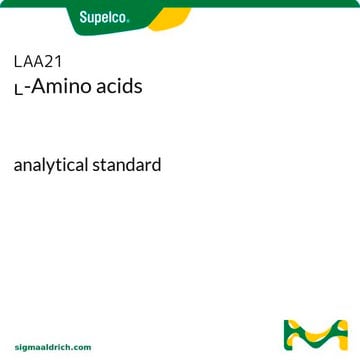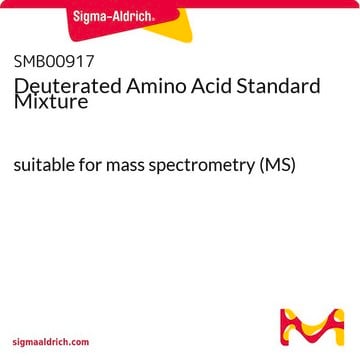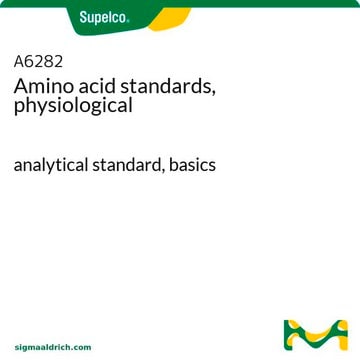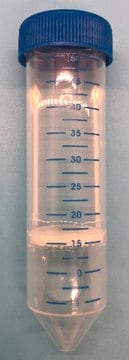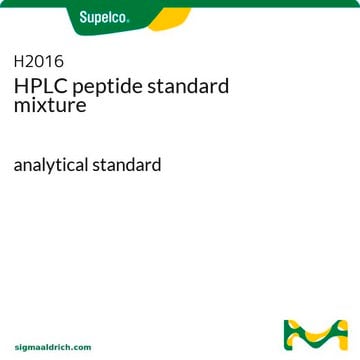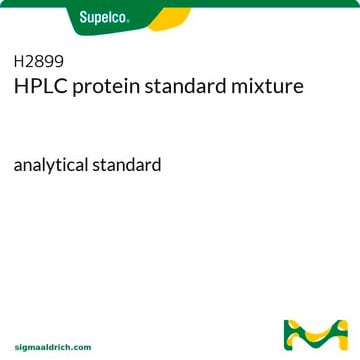A2161
Amino acid standards for fluorescence detection
analytical standard
Sign Into View Organizational & Contract Pricing
All Photos(1)
About This Item
UNSPSC Code:
85151701
eCl@ss:
32160406
NACRES:
NA.24
Recommended Products
grade
analytical standard
analyte chemical class(es)
amino acids, peptides, proteins
technique(s)
HPLC: suitable
gas chromatography (GC): suitable
application(s)
food and beverages
format
multi-component solution
storage temp.
2-8°C
Related Categories
Application
Refer to the product′s Certificate of Analysis for more information on a suitable instrument technique. Contact Technical Service for further support.
Other Notes
suitable for fluorescence detection
Qualitative standard. Amino acids and related compounds are in 0.1N HCl.
Analyte
Description
L-Alanine
Ammonium chloride
L-Arginine
L-Aspartic acid
L-Cystine
L-Glutamic acid
Glycine
L-Histidine
L-Isoleucine
L-Leucine
L-Lysine
L-Methionine
L-Phenylalanine
L-Proline
L-Serine
L-Threonine
L-Tyrosine
L-Valine
See All (18)
Signal Word
Warning
Hazard Statements
Precautionary Statements
Hazard Classifications
Met. Corr. 1
Storage Class Code
8B - Non-combustible corrosive hazardous materials
WGK
nwg
Flash Point(F)
Not applicable
Flash Point(C)
Not applicable
Choose from one of the most recent versions:
Certificates of Analysis (COA)
Lot/Batch Number
Don't see the Right Version?
If you require a particular version, you can look up a specific certificate by the Lot or Batch number.
Already Own This Product?
Find documentation for the products that you have recently purchased in the Document Library.
Customers Also Viewed
Hannaneh Tashackori et al.
Journal of plant physiology, 232, 115-126 (2018-12-12)
Lignans are diphenolic compounds produced in plants via coupling of two coniferyl alcohol molecules with the aid of a dirigent protein to form pinoresinol (PINO). The latter is reduced via lariciresinol (LARI) to secoisolariciresinol by the bifunctional pinoresinol-lariciresinol reductase (PLR).
Somaieh Zafari et al.
Plant physiology and biochemistry : PPB, 99, 11-20 (2015-12-29)
Lead (Pb) is a hazardous heavy metal present in the environment which elicits oxidative stress in plants. To characterize the physiological and biochemical basis of Pb tolerance, Prosopis farcta seedlings were exposed to Hoagland's solutions at six different Pb concentrations
Our team of scientists has experience in all areas of research including Life Science, Material Science, Chemical Synthesis, Chromatography, Analytical and many others.
Contact Technical Service